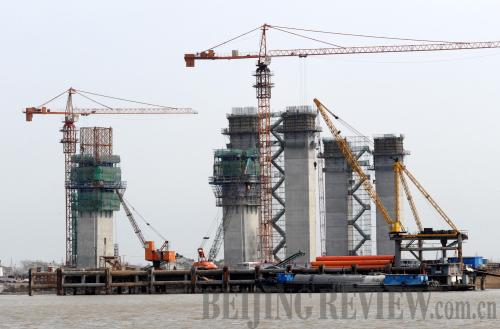|
 |
|
BUILDING SPREE: Jiangsu Province has spent 80 billion yuan ($11.7 billion) on its transportation system construction, including the 62-km-long Taizhou Yangtze River Bridge (SUN CAN) |
After several nervous months, China is finally breathing a sigh of relief as the powerful stimulus shifts the nation's growth engine out of low gear. The gross domestic product (GDP) expanded by 8.9 percent in the third quarter of this year, putting the target of 8 percent for the full year easily within reach.
The 4-trillion-yuan ($586 billion) stimulus package has undoubtedly pulled the economy out of what could have been a much deeper quagmire, said Ou Hong, Deputy Director of the Department of Fixed-Asset Investment under the National Development and Reform Commission (NDRC), at a recent press conference in Beijing. The press conference briefed the public about how the money has been used, and the achievements that have been made thanks to the stimulus plan.
Late last year, with the financial storm brewing, policymakers set out to initiate any measure necessary to keep the economy from slumping. And when shell-shocked U.S. consumers started exercising stricter spending habits, China began looking inward for a source of strength and sustainability. But what really sparked the country's inner dynamism was the immense 4-trillion-yuan fiscal package, which was focused on infrastructure spending over the course of the next two years. The prescribed dosage of stimulus was unprecedented, equivalent to 14 percent of the country's GDP in 2008.
According to data from the NDRC, investments in agriculture, education, social security and rural infrastructure have soared more than 40 percent from January to September year on year.
By putting vigorous efforts into improving rural infrastructure and residents' livelihoods, the package has also paved the way for a shift to a more sustainable growth model, said Ou.
Stringent regulatory supervision has ensured adequate fund allocation and quality of the projects, and has significantly prevented resource waste, he added.
Heeding government calls to fund the mushrooming industrial projects, commercial banks freed up lending to allow billions more to flow into the economy. With market confidence currently on the rise, buyers are returning to the real estate market and car showrooms in droves. Analysts believe the package has created a multiplier effect that is far more powerful than the headline stimulus investment.
Despite the resilience of the economy and its lightning scramble out of the economic turmoil, the package was not without doubts.
A bulk of the stimulus package was dedicated to infrastructure projects often operated by state-owned construction firms. Similarly, the lending spree was primarily directed at state enterprises that offered a better guarantee of solvency. Analysts fear this might deal a heavy blow to private firms, primarily small and medium-sized enterprises (SMEs) that have been reeling from the downturn.
Wu Jinglian, a senior economist with the Development Research Center under the State Council, said the government package seemed to favor state enterprises, leaving the private sector—the biggest source of job creation—to fend for themselves.
Playing down concerns, Ou pointed out that the fiscal package was more of a boon than a blow to the private sector. The stimulative measures have effectively galvanized domestic demands and warmed up the business mood, setting the stage for private investors to tide over the downturn, he said.
A few numbers could provide a vivid insight into how the government package is spurring private investments. Private urban investments in fixed assets from January to July grew a hefty 34 percent from the previous year, according to the NDRC. Meanwhile, the loan balance of Chinese financial institutions to SMEs had climbed 28 percent from the beginning of this year to 14.1 trillion yuan ($2.06 trillion) by the end of September, said the central bank.
Ou added that the authorities are geared to place all firms on an equal footing to compete and continue to provide financial support for the technological innovation and product improvement of the small companies.
More efforts will be made to allow private investors into a wider range of industries and strengthen services for them, he said.
Given the dual role of investment in creating supply and demand in the short run, economists are also raising concerns about industrial overcapacity.
Over the past few years, China has held that problem at bay by exporting a substantial amount of products abroad. The sharp recession in the developed world, however, has taken that protection away, said Zuo Xiaolei, chief economist of the Beijing-based China Galaxy Securities Co. Ltd.
For instance, the nationwide capacity for crude steel production had hit 660 million tons by the end of 2008, but only 453 million tons were sold.
In response, Ou recognized the need to put a swift brake on redundant capacities in saturated sectors. In addition, the regulators are taking measures to weed out inefficient and polluting factories, and push forward hi-tech innovations, added Ou.
This may require a compromise on the speed of GDP growth. But given the far-reaching implications for improved economic health, a short-term growth sacrifice is well worth the effort, said Ha Jiming, chief economist with the China International Capital Corp. Ltd. | 